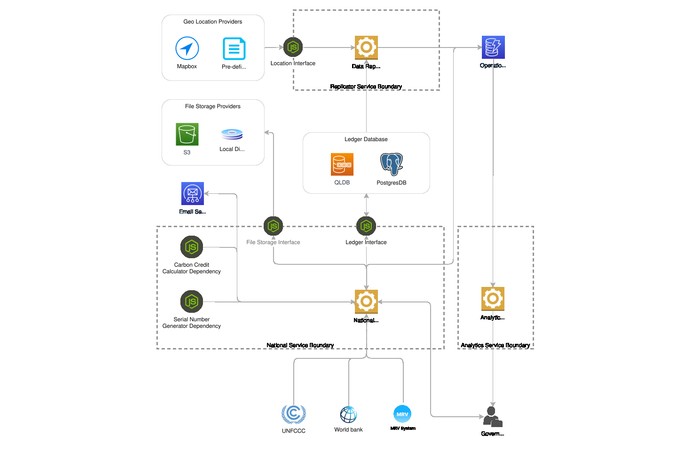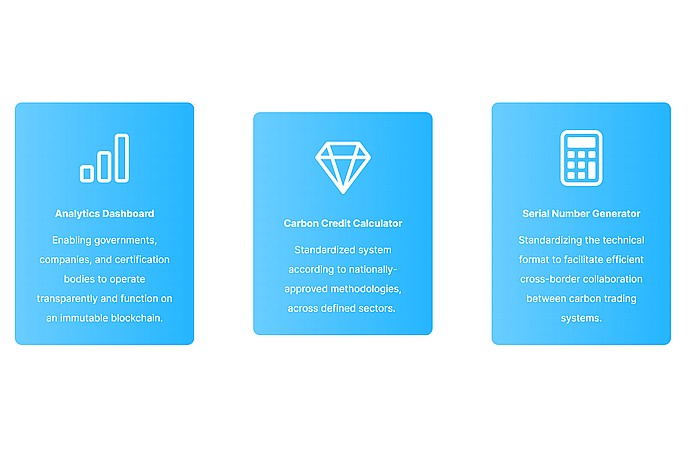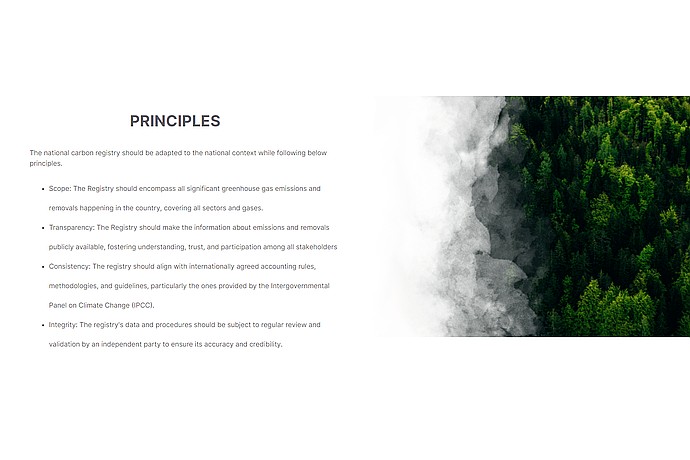
Language
HTML
Tool Type
Web app
License
GNU Affero General Public License 3
Version
1.0
National Carbon Credit Registry

The National Carbon Credit Registry is a platform developed by UNDP to facilitate the management of carbon credits. Using blockchain technology, this system ensures transparency and efficiency in the transfer of credits, helping countries meet their commitments under the Paris Agreement. Being customizable, it adapts to the specific needs of each country, allowing effective integration into its carbon mitigation programs. This registry helps avoid double counting and ensures that each carbon credit is accounted for correctly, thus supporting the fight against climate change.
The National Carbon Credit Registry solves several critical problems associated with carbon credit management, such as lack of transparency, complexity in transferring credits, and the risk of double counting. By providing a centralized and secure blockchain-based system, it allows countries and entities to register and manage carbon credits efficiently and transparently, meeting the requirements of the Paris Agreement and encouraging greater participation in climate change mitigation efforts.
**Carbon Credit Tracking**: Accurately records and tracks carbon credit transactions, including issuance, transfer, and retirement of credits. **Regulatory Compliance**: Ensures adherence to international and national environmental regulations and standards for carbon emissions and trading. **Data Security and Integrity**: Implements robust security measures to safeguard sensitive environmental and transactional data. **User-Friendly Interface**: Provides an intuitive interface for users to manage and monitor their carbon credit portfolios. **Integration with Environmental Databases**: Seamlessly integrates with external environmental databases and systems for real-time data access and verification. **Real-Time Reporting and Analytics**: Offers real-time reporting tools for tracking carbon emission reductions and credit utilization. **Audit Trail and Transparency**: Maintains a comprehensive audit trail for each credit, enhancing transparency and accountability in carbon trading. **Multi-Stakeholder Accessibility**: Accessible by various stakeholders, including businesses, governments, and environmental organizations, facilitating wide participation in carbon trading. **Automated Validation and Verification**: Automated processes for validating and verifying carbon reduction claims, ensuring the credibility of credits. **Scalability and Flexibility**: Designed to scale with the evolving carbon market and flexible enough to adapt to changing regulations and market demands.
Built with Python, Java, and JavaScript, it uses these languages for backend and frontend. Manages databases with PostgreSQL or MongoDB. Designs APIs following RESTful or GRAPHQL standards to facilitate integration. Adopts security protocols like SSL/TLS and OAuth 2.0. Implements advanced encryption to protect data. Leverages cloud platforms like AWS, Azure, or Google Cloud for infrastructure. Uses Docker and Kubernetes for microservices management. Employs automated testing and CI/CD to ensure quality. Complies with environmental dat

Connect with the Development Code team and discover how our carefully curated open source tools can support your institution in Latin America and the Caribbean. Contact us to explore solutions, resolve implementation issues, share reuse successes or present a new tool. Write to [email protected]

UNDP Carbon Registry is based on service oriented architecture (SOA). Following diagram visualize the basic components in the system.

The image shows three sections: "Analysis Panel" for blockchain transparency; "Carbon Credit Calculator" with approved methodologies; "Serial Number Generator" for carbon trading collaboration. Blue background.

The image illustrates principles for a national carbon registry: scope, transparency, consistency, and integrity, following international rules and independent reviews for gas emissions and removals.
Page with information about the context, vision, policies and support of the carbon credit registration project.
